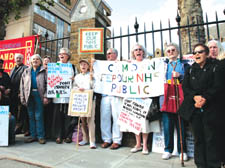|
|
 |
| |

Protesters make their point outside the meeting |
‘What are you scared of?’
American health firm chief says British ‘fear profit’ as protests go on
ONE of the top bosses of the private company in control of three doctors’ surgeries in Camden has angered patients by claiming it doesn’t matter if hospitals make profits for the New York stock exchange.
Dr Richard Smith, a director working for the UnitedHealth Group, made “the case for profit” at the Whittington Hospital’s annual health oration on Tuesday, on the 60th anniversary of the National Health Service.
Around 30 Camden health campaigners demonstrated outside the Highgate hospital’s annexe as Dr Smith delivered his speech.
During the oration, he repeatedly referred to “those people at the gates” and warned of a cultural “fear of profit”.
Several in the audience said he had failed to understand that the not-for-profit principle of the NHS was “part of the DNA” of British culture.
Dr Smith said: “I have spoken at thousands of meetings and I don’t think there have been people at the gates. What are they scared about? It is something particular to the British.
“We are against profit, even though the vast majority of our products come from companies and it is hard to find a better way of improving quality than profit.
“I blame the Romantic poets. They said they wanted hills, not factories. In this country the perception is that profit is made through fiddling or deception. You imagine the plutocrat sitting in his yacht. That isn’t the case. The way to make profit is to meet people’s needs – the minute you don’t you are out.”
Despite a public outcry, UnitedHealth UK has run surgeries in Camden Road, King’s Cross Road and the Brunswick Medical Centre since April. Dr Smith left the company’s British arm just months before the contracts were signed but works as executive director of Ovations – another subsidiary of the UnitedHealth Group.
He defended private interest, adding: “What I wonder is how long that expansion goes on being funded by taxation? It is not sustainable. I have spoken to the people like those at the gate before and they have told me that they would prefer the private sector was not involved in the NHS even if it meant services did not improve.”
Maria Duggan, a leading health policy expert and non-executive director at the Whittington, said: “Importing other systems from other countries is not always the solution. We have a set of values, customs, culture – our zeitgeist.
“If, here at the Whittington, we make a profit it becomes a question of how we spend that surplus.”
But Dr Smith replied: “What does it matter if the surplus goes into the Whittington mess fund or into the New York stock exchange?”
Candy Udwin, from Keep Camden GPs in the NHS, said: “What the Whittington does with its surplus is totally different to a company that has, by law, to satisfy its shareholders.” |
 |
|
|
 |
|
 |
|